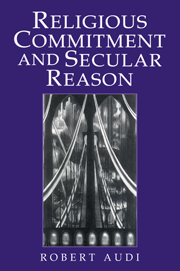Book contents
- Frontmatter
- Contents
- Preface
- PART ONE THE FOUNDATIONS OF DEMOCRACY AND THE SEPARATION OF CHURCH AND STATE
- 1 The Plurality of Paths to Liberal Democracy
- 2 The Separation of Church and State
- 3 Church-State Separation and the Justification of Governmental Power
- PART TWO THE ETHICS OF CITIZENSHIP AND THE BALANCE OF RELIGIOUS AND POLITICAL ARGUMENTS
- PART THREE CIVIC VIRTUE AND POLITICAL ACTIVISM IN A RELIGIOUSLY PLURALISTIC DEMOCRACY
- Conclusion: Ethics, Religion, and Democracy
- Notes
- Index
3 - Church-State Separation and the Justification of Governmental Power
Published online by Cambridge University Press: 05 June 2012
- Frontmatter
- Contents
- Preface
- PART ONE THE FOUNDATIONS OF DEMOCRACY AND THE SEPARATION OF CHURCH AND STATE
- 1 The Plurality of Paths to Liberal Democracy
- 2 The Separation of Church and State
- 3 Church-State Separation and the Justification of Governmental Power
- PART TWO THE ETHICS OF CITIZENSHIP AND THE BALANCE OF RELIGIOUS AND POLITICAL ARGUMENTS
- PART THREE CIVIC VIRTUE AND POLITICAL ACTIVISM IN A RELIGIOUSLY PLURALISTIC DEMOCRACY
- Conclusion: Ethics, Religion, and Democracy
- Notes
- Index
Summary
For liberal democracies, the overall purpose of government is to serve the people. This requires the protection of liberty and the maintenance of basic political equality, and those ideals in turn are the most important single ground for separation of church and state. It is particularly when the activities of government are coercive – as they generally are in the establishment of laws and public policies – that separation of church and state is important. It is also important in everyday governmental discussions and deliberations that do not lead to law or public policy yet are, for instance, interpretive or merely exploratory. But there is a special need for separation of church and state in the justification of governmental coercion. I have in mind chiefly the kinds of coercion achievable by legal penalties, but the coercion of public opinion and the threat of social ostracism also belong under a similar heading. Some of the reasons for this special need are evident from the case made in Chapter 2 for the libertarian, equalitarian, and neutrality principles. But far more should be said about the permissible grounds of coercion; and if a separation of church and state is required for coercion, we should also explore the role that religious arguments may nonetheless properly play in a liberal democracy. These two tasks are the main concern of this chapter.
- Type
- Chapter
- Information
- Religious Commitment and Secular Reason , pp. 59 - 78Publisher: Cambridge University PressPrint publication year: 2000



